Can Pluralism Go Hand in Hand with Collective Destiny?

Photo by Gunther Gamper.
*
Tolerance.ca has organized several panel discussions since 2002.
by Osée Kamga, coordinator of the Tolerance.ca evening held at the Maison des écrivains, in Montréal
To mark International Day for the Elimination of Racial Discrimination, Tolerance.ca® organized two panel discussions on religious diversity featuring several distinguished panellists. The first meeting was held at Vanier College. The second, on which a report follows, was held at the Maison des écrivains under the theme “Education, Religion and Diversity: Enrichment or Source of Conflict?” On the panel were Dr. Patrice Brodeur, Canada Research Chair on Islam, Pluralism and Globalization at the Université de Montréal; Dr. Amir Khadir, physician and co-founder of the new political party Québec solidaire; Dr.. Rabia Naguib, a researcher at HEC Montréal; and Dr. Marc-Alain Wolf, a psychiatrist at the Douglas Hospital and member of Tolerance.ca®.
Several students also spoke: Christian Agbobli and Mohamed Jelasi, both studying at the Université du Québec à Montréal; Karim Ben Maiz, a communications student at the Université du Québec à Montréal and president of the university’s Muslim students association; and Jonathan Blais, a political science student at the Université de Montréal and member of the group Communauté chrétienne missionnaire.
Yvan Cliche, an international development specialist and member of Tolerance.ca®, moderated the panel.
Dr. Naguib started off the evening by upholding difference as a source of enrichment. She quoted Saint-Exupéry, who said “If you differ from me, my friend, far from wronging me, you enrich me.” From that perspective, conflicts are not intrinsic to religious diversity, but stem from its customary practice. Ms. Naguib noted that like science, wealth and globalization, religion can either serve the common good or work against it.
Regarding the specific question of whether religion has a place in institutions of knowledge, Dr. Naguib first noted that human beings are multi-dimensional. People are at once rational and irrational, spiritual and physical. So the desire that some people have to satisfy their quest for spirituality is entirely legitimate. We should not deprive these people of the means to pursue that quest in dignity, because it is an integral part of them.
Secularism and reason, religion and fanaticism:
misleading associations
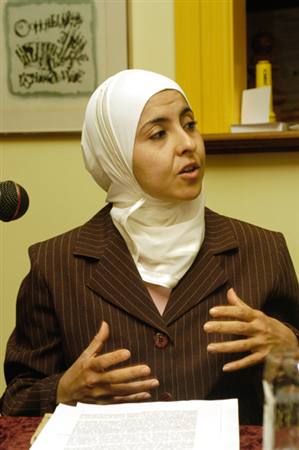
Photo by Gunther Gamper.
**
Dr. Naguib went on to deplore that secularism is quite naturally associated with reason, whereas religions are associated with fanaticism and dogmatism. Muslims in particular are associated with terrorism and veiled women with reactionary submission. She observed that increasingly, secularism is used as a means of discrimination against those who—if only in their appearance—challenge the established order, the ways of thinking and doing things of the dominant group, which considers itself normal and universal. For Dr. Naguib, the true source of conflict lies in ignorance, which is expressed as fear of the other and leads to incomprehension, sectarianism, intolerance and injustice. These in turn create a vicious circle and feed various types of conflict.
Returning to the issue of religion in the university setting, Rabia Naguib pointed out that on campus, there are places where you can eat, smoke, have a coffee, etc. It would not hurt anyone to have a place to pray. She noted that at certain moments, some people feel the need to recharge their spiritual batteries, to connect with transcendence. This spiritual moment must be characterized by dignity—yet to let people pray in the stairwells is to take away that dignity.
Professor Patrice Brodeur spoke next. He denounced the veil of ignorance through which we perceive the Muslim world. To him, the shift to the right that has occurred in Western societies is caused by the ongoing concern for security, by the tensions provoked by the events of September 11, 2001, and by the power the United States holds in determining how terrorism is interpreted. Dr. Brodeur noted that one of the concerns of the Ministère de l’Éducation in Quebec is the need to place the various religious cultures in a larger cultural context that takes into account the various secular lines of thought. To his mind, that is the way to encourage dialogue.
Secularism and intolerance
Dr. Brodeur noted with regret that the social fabric in Quebec has been eroded over the past 15 years. The situation is not exceptional, in his view, as it is linked to the global transformations wrought by globalization. Unfortunately, in such a context, the Islamophobia conveyed by certain media outlets is fuelled by ignorance. To Dr. Brodeur, it is important to understand how identities work. When identities are in the majority and hold power, he said, they become more or less invisible, because they are dominant. He believes that because we don’t understand the dynamics of identity, we forget that the secular majority of Quebec can also become intolerant. To him, the desire to eliminate all religious symbols at school constitutes a form of intolerance. The diversity that exists in society must also exist in school, so that people can be prepared to deal with diversity starting at a young age. This means that the various religious symbols and practices must be present in the school environment, so that they bear witness to the cultural diversity of society. Dr. Brodeur believes that the fears being expressed with regard to certain religious currents in Quebec reflect to an extent the province’s history, in that secularisation took place against a difficult background of religious intolerance. In his view, the model of intolerance adopted by Quebec Catholicism has been extended to the province’s declared secularism. Accordingly, he warned against what he called a secular fundamentalism.
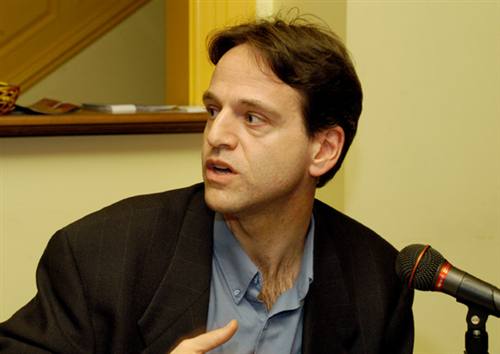
Photo by Gunther Gamper.
***
Clearly, Dr. Brodeur is suspicious of the prevailing ultra-secularism. He said it was unfortunate that we are moving from a situation where a majority religion dominated the campus to a model that claims to refuse all forms of religion on the campus. That amounts to throwing out the baby with the bathwater! On the contrary, he suggested, we must go from a majority religion within an academic institution to multiple spaces for “inter-spirituality,” which would allow people who define themselves through religious practices to do so. To his mind, the fact that in several universities, we now speak of religious and spiritual life rather than of the chaplaincy represents progress.
Religious schools and public funding
For his talk, Dr. Marc-Alain Wolf started with a concrete example—the public funding of Jewish schools—in order to call for greater social openness to various religious sensitivities. Public school does not provide adequate space for an observant Jew to practise his or her religion, he stated. For example, an observant Jew can only eat in kosher cafeterias, and must respect numerous holidays over the course of the year.
Despite efforts to secularize the Quebec school system, Dr. Wolf noted that the calendar is still obviously a Christian calendar and is not adapted to the needs of religious Jews. Given that, he argues for the principle of public funding for secular curriculum material in religious institutions, a principle that is indeed legitimate in a number of countries. Lastly, to Dr. Wolf, each religion has specific needs and it is increasingly necessary that society recognize them.
The importance of acting as a full citizen
Dr. Amir Khadir started his talk by acknowledging that religion can be a source of conflict. But that in itself is not so terrible, because some kind of tension is inevitably linked to the appearance of a new element in a given milieu.
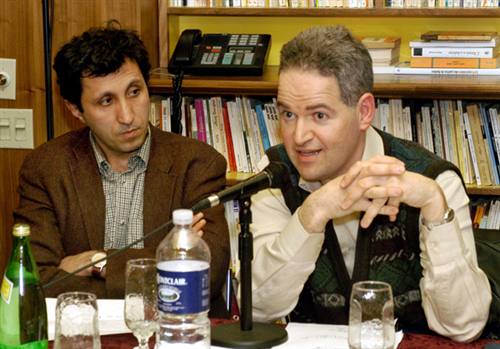
Photo by Gunther Gamper.
****
For him, the real question is how to deal with these tensions. In a show of optimism, Dr. Khadir recalled that, while the balance of power remains extremely unfavourable to immigrants, they must stop confining themselves to the role of foreigner. Immigrants must take their rightful place in the collective destiny of Quebec society—not limit themselves to their rights as a community, but engage in the collective destiny and contribute to various social struggles. Only through this effort, believes Amir Khadir, will immigrants be able to ensure that their rights are respected. He argued that tension must lead to a new social construction in which immigrants take part, no longer as rights claimants, but as full citizens.
In favour of shared values
For his part, Karim Ben Maiz, a student at the Université du Québec à Montréal, drew attention to the matter of spaces for prayer. In his view, they could be considered one of the many services universities are called upon to provide for their students. He noted that an association like the one he is president of not only aims to build awareness of Islam, but also works to build bridges with the other elements of society. He believes that a tolerant society is built through discussion, dialogue, openness and respect. Communal life is enriched by common sense, goodwill and reasonable accommodation. He said he regretted the strong resistance that constantly reminds immigrants that they are foreigners and, as such, should neither make known nor share their values.
Highlights of the discussion
Questioned by a member of the audience who felt that immigrants should adapt to the laws in force in the host country, Ms. Naguib pointed out that such a question is unfounded, in that it implies an opposition between faith and the law. In her view, faith falls under the private sphere and does not prevent a person from respecting the law of the land.
Amir Khadir took the microphone to note that the discussion illustrated the tension that exists between a legal approach and a political approach as a way to determine social bonds. We know that in politics, one can decide to do things and to undo things, he said. That reflects the balance between the forces in power. Dr. Khadir expressed his opinion that basing everything on the law risked creating a fragmentation of society, and he insisted on the need to re-balance things in favour of political bonds.
In his view, integration means that immigrants participate in all social spheres, including those in which rights are defined. “When in Rome,” he said, “you go to the Senate and decide with those who are there what the new Rome will be like.” This position implies that immigrants also make an effort, that they give up the predeterminations of their religious or cultural life. In fact, according to Dr. Khadir, these determinations are now being questioned, even in the countries of origin.
Patrice Brodeur noted that we can find points in common not only between the various religions, but also between religions and secular values. If universities object to spiritual needs, they should also close the gyms, he said. To him, while the primary mission of the university is intellectual learning, to do so while ignoring the other dimensions of the human being would represent a form of reductionism.
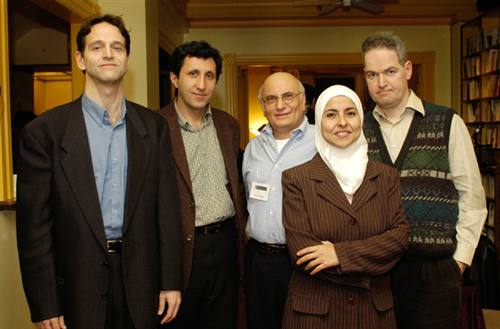
Photo by Gunther Gamper.
*****
Marc-Alain Wolf noted that while most people agree with the principle of providing places of worship, it is not principles that lead to political decisions. In his view, the responsibility of politics is to resolve conflicts, which at times requires that it set aside principles. Dr. Wolf reminded the audience that the secularism so prevalent today is not the result of a specific policy principle, but rather, it was established historically in order to resolve and diminish the conflicts between various Christian communities. Today, we must ask ourselves whether that secularism still meets the demand.
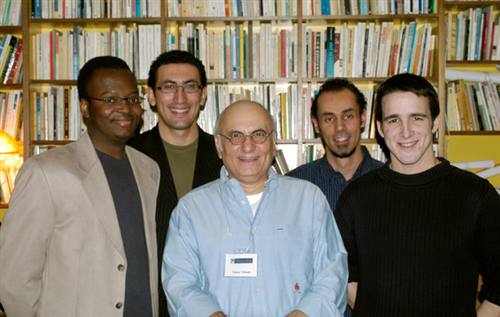
Photo by Gunther Gamper.
******
Translated by Christine York
 The event “Education, Religion and Diversity: Enrichment or Source of Conflict?” is a production of Tolerance.ca®. Idea and organization: Victor Teboul. Coordination: Osée Kamga. The event took place on March 23, 2006, at the Maison des écrivains in Montréal. It was organized as part of a series on the diversity of values and religious beliefs in colleges and universities and is presented with the financial support of
The event “Education, Religion and Diversity: Enrichment or Source of Conflict?” is a production of Tolerance.ca®. Idea and organization: Victor Teboul. Coordination: Osée Kamga. The event took place on March 23, 2006, at the Maison des écrivains in Montréal. It was organized as part of a series on the diversity of values and religious beliefs in colleges and universities and is presented with the financial support of:
 *
* The panellists, from left to right: Dr. Amir Khadir, Dr. Marc-Alain Wolf, Yvan Cliche, Rabia Naguib, and Dr. Patrice Brodeur.
** Dr. Rabia Naguib.
*** Dr. Patrice Brodeur.
**** Amir Khadir and Marc-Alain Wolf.
***** Patrice Brodeur, Amir Khadir, Victor Teboul (the Editor of the Tolerance.ca Webzine), Rabia Naguib and Marc-Alain Wolf.
****** Christian Agbobli, Mohamed Jelassi, Victor Teboul, Karim Ben Maiz and Jonathan Blais.